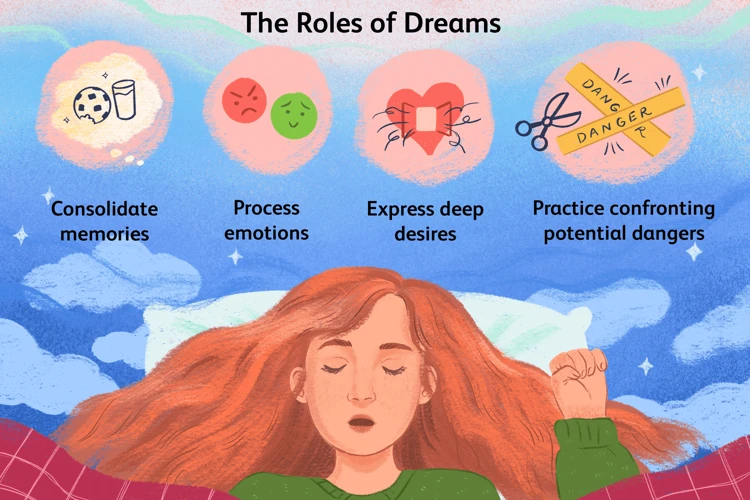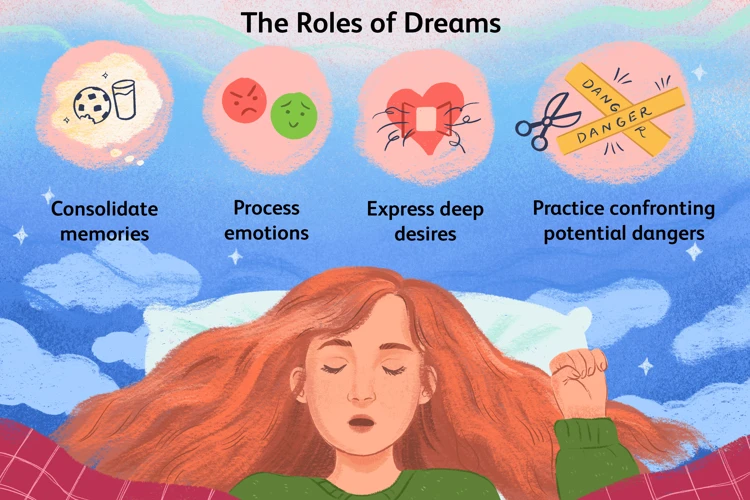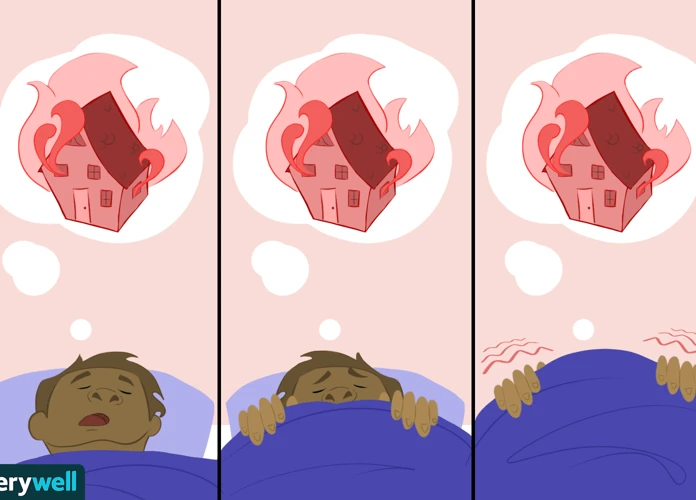Imagine waking up in the morning with a lingering sense of confusion and curiosity, trying to unravel the mysteries of the recurring dreams that have been dominating your nights. These enigmatic dreams, which seem to repeat themselves over and over again, hold a psychological significance that is worth exploring. In this article, we delve into the depths of our subconscious mind to understand the perplexing nature of recurring dreams, dissect various theories that shed light on their meaning, uncover common themes that arise in these dreams, and provide practical techniques to interpret and reduce their occurrence. Join us on a journey of self-discovery as we unravel the secrets behind the psychological significance of recurring dreams.
What are Recurring Dreams?

Recurring dreams are a fascinating phenomenon that has puzzled dream researchers and individuals alike. These dreams are characterized by their repetitive nature, occurring frequently over a period of time. They often involve similar themes, symbols, or events that replay themselves night after night. The vividness and intensity of recurring dreams can leave us pondering their hidden meanings and significance. While the content of these dreams may vary from person to person, they serve as a window into our subconscious mind and can provide valuable insights into our thoughts, emotions, and experiences. Some people experience recurring dreams that feature specific scenarios or locations, while others may encounter recurring nightmares that leave them feeling unsettled. These dreams may seem perplexing, leaving us to question their purpose and the messages they hold. Are they simply a product of our subconscious mind processing information from daily life, or do they hold a deeper symbolic meaning? Understanding the nature of recurring dreams is the first step towards unraveling their significance and gaining a deeper understanding of ourselves. To explore the topic further, let’s delve into some of the theories that attempt to explain these mysterious dreams and their hidden messages.[1]
Theories on the Significance of Recurring Dreams

The significance of recurring dreams has been the subject of various theories proposed by experts in the field of dream analysis. One prominent theory is the psychoanalytic perspective, which suggests that recurring dreams serve as a means of expressing unresolved conflicts and desires from our unconscious mind. According to this theory, recurring dreams offer a symbolic representation of repressed emotions or experiences that we may not be consciously aware of. Another theory, known as the cognitive theory, posits that recurring dreams are a result of our brain’s attempt to process and consolidate information from our daily experiences. These dreams may reflect our efforts to make sense of complex situations or to integrate new knowledge into our existing cognitive frameworks. Additionally, the emotional processing hypothesis suggests that recurring dreams play a role in emotional regulation and healing. These dreams may provide a safe space for us to confront and work through difficult emotions, such as trauma or grief.[1] Theories on the significance of recurring dreams offer intriguing insights into the workings of our subconscious mind and provide a framework for understanding their deeper meanings.
1. Psychoanalytic Perspective
The psychoanalytic perspective offers valuable insights into the significance of recurring dreams. According to Sigmund Freud, the father of psychoanalysis, dreams are windows to our unconscious mind, and their repetitive nature serves a specific purpose in facilitating the release of repressed desires and emotions. From a psychoanalytic standpoint, recurring dreams may represent unresolved conflicts, past traumas, or unfulfilled desires that are deeply buried in the unconscious. These dreams provide a safe space for our unconscious mind to process and confront these unresolved issues, allowing us to gain insight into our deepest fears, desires, and emotions. By analyzing the symbols, events, and emotions present in recurring dreams, we can begin to unravel and address the unconscious forces that influence our waking lives. For example, a recurring dream of being chased may symbolize a persistent fear or anxiety that needs to be confronted and resolved. Exploring the role of recurring dreams in processing trauma[2] can be particularly helpful in understanding and healing from past emotional wounds. Psychoanalytic theory emphasizes the importance of exploring the symbolism and meaning within recurring dreams to gain a deeper understanding of ourselves and promote self-discovery and personal growth.
2. Cognitive Theory
Cognitive theory provides another perspective to understand the significance of recurring dreams. According to this theory, recurring dreams are a result of our cognitive processes and the way our brain organizes and stores information. Our dreams act as a way for our brain to process and consolidate memories, thoughts, and emotions that we have experienced throughout the day.
From a cognitive standpoint, recurring dreams might occur when our mind repeatedly tries to make sense of certain unresolved issues or conflicts. These dreams could represent persistent cognitive patterns or thought processes that need attention and resolution. For example, if someone constantly dreams about being unprepared for an important exam or presentation, it could reflect their ongoing anxiety or fear of failure in real life.
Cognitive theory also suggests that recurring dreams can be influenced by our schemas, which are mental frameworks or structures that help us interpret and understand the world. Our schemas filter and organize the information we encounter, and recurring dreams may arise when our existing schemas are challenged or need to be modified. These dreams could serve as a way for our mind to reconcile conflicting beliefs or develop new insights and perspectives.
In essence, the cognitive theory posits that recurring dreams are a natural part of our cognitive processes and reflect our brain’s attempt to make sense of our experiences and find resolution. By paying attention to the recurring themes and patterns in our dreams, we can gain valuable insights into our cognitive and emotional processes, which can aid in personal growth and self-reflection.
3. Emotional Processing Hypothesis
The Emotional Processing Hypothesis is a significant theory that seeks to explain the significance of recurring dreams in terms of emotional regulation and processing. According to this hypothesis, recurring dreams serve as a mechanism through which our mind tries to process and make sense of intense or unresolved emotions. These emotions may stem from recent events, past traumas, or deeply buried experiences that we have yet to confront consciously. Recurring dreams provide a safe space for us to revisit these emotional experiences and explore them on a subconscious level. They allow us to replay and re-experience these emotions, potentially helping us to process and integrate them into our conscious awareness. Through these dreams, we get the opportunity to confront and work through unresolved emotional issues, allowing us to heal and move forward in our waking lives. By repeatedly presenting us with these emotional themes, our mind is guiding us towards emotional integration and resolution. It is important to approach recurring dreams with curiosity and openness, as they may contain valuable clues towards our emotional well-being and personal growth. Understanding the Emotional Processing Hypothesis gives us insight into the potential role and benefits of recurring dreams in our psychological development.
Common Themes in Recurring Dreams

Common themes in recurring dreams can provide valuable insights into our subconscious mind and the issues we may be dealing with on a deeper level. While the specific content of these dreams can vary from person to person, there are some recurring themes that tend to emerge. One common theme is being chased or pursued, which reflects feelings of being overwhelmed, under threat, or pursued by a problem or challenge in waking life. Another frequent theme is falling, which may symbolize a lack of control, insecurity, or fear of failure. Another prevalent theme is being unprepared for an exam or presentation, which can indicate feelings of insecurity, inadequacy, or a fear of being judged. Other common themes include being trapped or unable to move, losing teeth, experiencing the death of a loved one, or being naked in public. These themes may seem peculiar or unsettling, but they often represent deeper emotions and fears that we may need to address. By recognizing these common themes and exploring their symbolic interpretations, we can gain a better understanding of the underlying issues and emotions we may be grappling with in our waking life.[1]
Interpreting Recurring Dreams

Interpreting recurring dreams can be both a perplexing and enlightening journey. To unlock the hidden messages and meanings embedded within these dreams, it is essential to employ various techniques and strategies. One effective method is keeping a dream journal, where you record the details and emotions experienced in each recurring dream. This allows you to identify patterns, symbols, and themes that consistently appear. Analyzing these symbols and themes is another valuable approach, as it helps you understand the underlying messages and emotions being conveyed by your subconscious mind. Symbols can vary greatly in their meaning, so it is important to consider personal associations and cultural symbolism when deciphering their significance. Seeking professional guidance, such as a therapist or dream analyst, can also provide valuable insights and interpretations. These experts can help you explore the deeper layers of your recurring dreams and provide guidance on how to integrate their messages into your waking life. Whether through journaling, symbol analysis, or professional help, interpreting recurring dreams can offer profound insights into your unconscious mind and promote personal growth and self-awareness.
1. Keeping a Dream Journal
Keeping a Dream Journal
One effective technique for interpreting recurring dreams is to keep a dream journal. This involves recording your dreams in a diary or journal immediately after waking up. By consistently documenting your dreams, you can begin to notice patterns, symbols, and themes that commonly occur. This practice helps you develop a deeper awareness of your dreams and aids in the identification of recurring elements. When recording your dreams, be sure to include as much detail as possible, such as the emotions experienced, the setting, the people involved, and any significant objects or events. This level of detail allows you to revisit your dreams later and analyze them with a fresh perspective. Additionally, it may be helpful to make notes of any real-life experiences or events that could be influencing your dreams. Over time, as you accumulate more entries in your dream journal, you may start to uncover hidden meanings and connections between your dreams and your waking life. Keeping a dream journal can be a valuable tool for self-reflection and a stepping stone towards understanding the psychological significance of your recurring dreams.
2. Analyzing Symbols and Themes
Analyzing symbols and themes is a crucial step in interpreting recurring dreams. When we pay close attention to the symbols and recurring elements within our dreams, we can uncover hidden meanings and gain insights into our subconscious mind. One approach to analyzing symbols is to keep a dream journal, documenting the details of each dream, including people, objects, locations, and emotions experienced. By noting down these symbols, we can start to identify patterns and recurring themes that may hold significance. Another technique is to create a dream collage or vision board, where we gather images and symbols that resonate with our dreams. This visual representation can help us visually connect the dots and interpret the underlying messages. Additionally, using a dream dictionary or online resources can provide insights into the symbolic meanings of common dream symbols. However, it’s essential to remember that personal associations and experiences with the symbols play a significant role in their interpretation. So, what might be considered a universal symbol for one person may hold a different meaning for another. It’s crucial to explore our own personal relationship with the symbols and themes that recur in our dreams, allowing for a more accurate interpretation and self-reflection.
3. Seeking Professional Guidance
Seeking professional guidance is a vital option when it comes to interpreting recurring dreams. Consulting with a qualified therapist or dream analyst can provide valuable insights and interpretations that may not be easily accessible on our own. These professionals have the knowledge and expertise to navigate the intricate realms of our subconscious mind and help us uncover the hidden meanings behind the recurring dreams. By discussing our dreams with them, we can gain a fresh perspective and a deeper understanding of the psychological significance embedded within. Therapists may use various techniques such as dream analysis, psychotherapy, or hypnosis to delve into the underlying emotions, symbols, and experiences that shape our recurring dreams. Additionally, they can assist in identifying patterns or triggers that may be influencing the recurrent nature of the dreams. Through this process, we can gain clarity, gain self-awareness, and even find potential solutions to the issues or conflicts that may be surfacing in our dreams. Seeking professional guidance is particularly beneficial for individuals who are experiencing distress or difficulty in managing their recurring dreams, as it provides a supportive and knowledgeable space for exploration and healing. Remember, you don’t have to navigate the realm of recurring dreams alone – professional guidance can offer valuable insight into decoding their psychological significance and aid in our personal growth and development.
The Significance of Recurring Dreams in Personal Growth and Development

The significance of recurring dreams extends beyond mere curiosity and interpretation. These dreams can play a crucial role in our personal growth and development. As we delve into the repetitive patterns and symbols present in these dreams, we gain valuable insights into our deepest desires, fears, and unresolved issues. These dreams act as a guide, directing our attention to aspects of ourselves that require attention and transformation. Through recurring dreams, we are given the opportunity to confront our inner conflicts, face our fears, and heal emotional wounds. The repetitive nature of these dreams serves as a reminder that certain aspects of our lives or psyche need attention and resolution. By exploring the themes and symbols found in recurring dreams, we can identify patterns or behaviors that may be holding us back from personal growth. These dreams provide a safe and symbolic space for us to process our emotions, reflect on our experiences, and make positive changes. Embracing the significance of recurring dreams can lead to a greater sense of self-awareness, empowerment, and transformation in our journey of personal growth and development.
How to Stop or Reduce Recurring Dreams
If you find yourself plagued by recurring dreams and yearn for a peaceful night’s sleep, there are steps you can take to stop or reduce their frequency. Identifying triggers is the initial key to addressing these dreams. Pay attention to your daily life, emotions, and experiences that may be influencing the content of your dreams. Once you have identified triggers, you can work on addressing them directly or finding ways to mitigate their impact. Practicing relaxation techniques, such as deep breathing exercises or meditation, can help calm your mind before sleep and decrease the likelihood of experiencing intense dreams. Additionally, cognitive-behavioral therapy (CBT) can be beneficial in helping you reframe negative thought patterns and develop strategies to cope with recurring dreams. Remember, while it may take time and effort to reduce or eliminate recurring dreams, these techniques can provide you with the tools to regain control over your dream experiences and achieve a more restful sleep.[1]
1. Identifying Triggers
Identifying triggers is a crucial step in understanding and reducing recurring dreams. Triggers are the catalysts or stimuli that initiate these repetitive dreams. By recognizing and addressing these triggers, we can gain valuable insights into the underlying issues that our subconscious mind is trying to process. Triggers can vary from person to person and may include specific events, emotions, or experiences that elicit a strong emotional response. It is important to pay attention to patterns and common elements present in your recurring dreams to identify possible triggers. These triggers could be related to unresolved conflicts, past traumas, or even current stressors in your life. Keeping a dream journal can be immensely helpful in this process, as it allows you to record and analyze the details of your dreams, making it easier to spot recurring themes or symbols that could point to potential triggers. Once you have identified these triggers, it is essential to address and resolve the underlying issues that they represent. This can involve seeking therapy, talking to a trusted friend or family member, or practicing self-reflection and introspection. By taking proactive steps to identify and address triggers, you can begin to break the cycle of recurring dreams and promote personal growth and healing.
2. Practicing Relaxation Techniques
Practicing relaxation techniques can be a helpful strategy for reducing the occurrence of recurring dreams. Stress and anxiety can often contribute to the frequency and intensity of these dreams, making it important to find ways to relax and calm the mind before sleep. One effective technique is progressive muscle relaxation, where you systematically tense and then relax different muscle groups in your body. This process helps release tension and promotes a state of relaxation. Another technique is deep breathing exercises, which involve taking slow, deep breaths, focusing on the sensation of the breath entering and leaving your body. This can help to regulate your breathing and induce a feeling of relaxation. Additionally, engaging in soothing activities before bed such as taking a warm bath, listening to calming music, or practicing meditation can also help relax the mind and promote a more peaceful sleep. By incorporating these relaxation techniques into your bedtime routine, you can create an environment that is conducive to restful sleep and reduce the chances of recurring dreams interrupting your slumber.
3. Cognitive Behavioral Therapy (CBT)
Cognitive Behavioral Therapy (CBT) is a therapeutic approach that has been found to be effective in reducing the frequency and intensity of recurring dreams. This form of therapy focuses on identifying and challenging negative thought patterns and beliefs that contribute to the persistence of these dreams. In the context of recurring dreams, CBT aims to address the underlying psychological factors that may be fueling their recurrence. It involves working with a trained therapist who can help you examine the thoughts, emotions, and behaviors associated with these dreams. Through CBT, you can gain insight into the triggers and patterns that contribute to the recurring nature of your dreams. The therapist will guide you in developing effective coping strategies to manage the anxiety or distress that may arise from these dreams. Additionally, CBT can help you reframe negative or distorted beliefs that may be influencing the content and emotional impact of your recurring dreams. This therapy approach may also involve relaxation techniques, stress management strategies, and other interventions designed to reduce the occurrence of recurring dreams. By addressing the underlying cognitive and behavioral factors, CBT can empower individuals to take control of their dreams and reduce their impact on daily life. If you find that recurring dreams are causing significant distress or interfering with your well-being, seeking the guidance of a CBT therapist can be a valuable step towards finding relief and understanding the psychological significance of these dreams.
Conclusion
In conclusion, recurring dreams hold great psychological significance and offer valuable insights into our subconscious mind. They can provide clues about unresolved issues, unprocessed emotions, and deep-seated fears. While the exact meaning of these dreams may vary from person to person, exploring common themes, symbols, and emotions can help us decode their hidden messages. Keeping a dream journal, analyzing symbols and themes, and seeking professional guidance are effective methods for interpreting recurring dreams and gaining deeper self-awareness. Additionally, recurring dreams can serve as catalysts for personal growth and development, as they invite us to confront and address unresolved issues in our waking life. Furthermore, techniques such as identifying triggers, practicing relaxation methods, and cognitive behavioral therapy (CBT) can help reduce the frequency and intensity of recurring dreams. By actively engaging with our dreams and their underlying messages, we can unlock the transformative power of recurring dreams and embark on a journey of self-discovery and understanding. So, the next time you find yourself caught in the loop of a recurring dream, embrace it as an opportunity for growth and embark on the path of unraveling its psychological significance.
Frequently Asked Questions
1. Why do recurring dreams happen?
Recurring dreams occur due to various factors, such as unresolved emotions, unresolved conflicts, or repetitive patterns in our daily lives. The subconscious mind uses these dreams as a way to process and bring attention to these unresolved issues or patterns.
2. Are recurring dreams common?
Yes, recurring dreams are quite common. Many individuals experience them at some point in their lives. However, the frequency and intensity of recurring dreams may vary from person to person.
3. Can recurring dreams have different meanings for different people?
Absolutely! The meanings of recurring dreams can vary based on an individual’s personal experiences, beliefs, and emotions. It is essential to analyze them in the context of each individual’s unique background.
4. Do recurring dreams always have a significant message?
Not necessarily. While recurring dreams can often carry meaningful messages, they can also be a result of the mind processing mundane information or simply reflecting the anxieties and worries present in our daily lives.
5. Can recurring dreams be related to trauma?
Yes, recurring dreams can sometimes be connected to past traumatic experiences. These dreams can serve as a means of processing and working through the emotions and memories associated with the trauma.
6. Can recurring dreams change over time?
Yes, recurring dreams can evolve and change as we grow and our circumstances change. This reflects our ongoing psychological and emotional development.
7. Can recurring dreams be influenced by external factors?
Absolutely. External factors such as stress, major life events, or changes in environment can influence the content and frequency of recurring dreams.
8. Should I be concerned if I have recurring nightmares?
Recurring nightmares can be distressing, but they are not necessarily cause for alarm. They often serve as a cue for us to pay attention to unresolved fears or issues. However, if nightmares are significantly impacting your daily life, it may be helpful to seek professional guidance.
9. Can recurring dreams be recurring memories?
Recurring dreams can sometimes symbolize recurring memories or unresolved experiences. The subconscious mind may use these dreams to encourage conscious acknowledgment and processing of these memories or experiences.
10. Can interpreting recurring dreams offer personal growth?
Yes, interpreting recurring dreams can provide valuable insights into our subconscious mind, allowing for self-reflection, personal growth, and a deeper understanding of ourselves. They offer an opportunity to address unresolved issues and work towards personal development.








